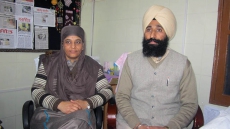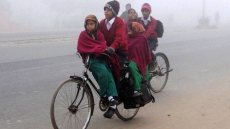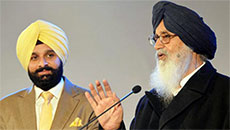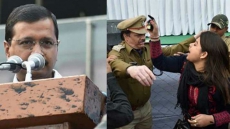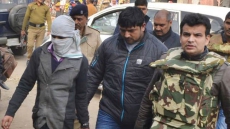Ending decades of wait, the Indian government on Saturday declassified the first set of 100 files on revolutionary leader Netaji Subhas Chandra Bose, whose whereabouts after a reported air crash continues to be a mystery even after 70 years.
Prime Minister Narendra Modi, who had announced during a meeting with Netaji's family members in October last year to make the hitherto secret files public, released digital copies of the documents running into around 16,600 pages at the National Archives of India, evoking overwhelming emotion, protests and even snide remarks.
The files were released on the 119th birth anniversary of Bose -- popularly addressed with the honorific Netaji -- a leading light of the Indian freedom struggle, who valiantly led the Indian National Army against the British Indian Army during World War II.
Modi also launched a webportal -- https://netajipapers.gov.in -- to release the digital version of the declassified documents.
"As a first step, the National Archives of India is placing 100 files relating to Netaji in public domain after preliminary conservation treatment and digitisation," a statement released by the Prime Minister's Office (PMO) said.
Today we began our efforts to declassify the Netaji files & place the truth in front of our citizens. pic.twitter.com/Q4L1kvXmif
— Narendra Modi (@narendramodi) January 23, 2016
It added that the remaining files will be placed in the public domain after their conservation treatment and digitisation.
"The government of India has written to the concerned foreign governments to declassify all files or papers related to Netaji. The government is committed to pursue this matter with them," the statement said.
A number of members of Netaji's family present during the declassification were overcome with emotion.
Netaji's niece Chitra Ghosh broke down in tears. His grandnephews Chandra Bose and Surya Kumar Bose were also teary eyed as they called it a "great day for the entire nation".
However, Surya Bose added that the documents released during the day were not the much-needed intelligence files.

In Kolkata, Sugata Bose -- another grandnephew of Netaji and Trinamool Congress MP -- found fault with Modi for choosing the revolutionary leader's birthday to declassify files, and said he should have spoken to Japanese Prime Minister Shinzo Abe to clear the air about Netaji's "death".
He also remarked that the freshly declassified documents would not bring up any new information.
The first lot of 33 files were declassified by the PMO and handed over to the National Archives of India on December 4, 2015.
"Subsequently, the ministries of home affairs, and external affairs too initiated the process of declassification of files relating to Netaji Subhas Chandra Bose in their respective collection which were then transferred to the National Archives of India," the PMO statement added.
The National Archives received 990 declassified files, pertaining to the INA, from the defence ministry in 1997.
The release of the files "will meet the long-standing public demand" and "will also facilitate scholars to carry out further research on Netaji", a culture ministry statement said.
A former Congress president and once a close associate of Mahatma Gandhi, Bose's reported death in a plane crash in Formosa, now Taiwan, on August 18, 1945 has not found acceptance among many members of his extended family, political organisations, researchers, social activists and the leader's countless fans.
Born on January 23, 1897 in Cuttack, Odisha, Bose stood fourth in the Indian Civil Service examination, but declined to join the coveted cadre as he did not want to serve the British masters. Instead, he plunged into the freedom movement.
However, Modi's declassification of the Netaji files failed to impress his political opponents.

Congress spokesperson Anand Sharma demanded declassification of all files but accused the Modi government of efforts to stoke a controversy and misguide the people by resorting to a "mischievous political campaign".
Trying to turn the pressure on the Centre, West Bengal Chief Minister Mamata Banerjee said the nation wanted to see those files which have information on whether Netaji was alive or not after August 18, 1945.
Alluding to the theory that Netaji had gone to Russia in 1945, Banerjee demanded in Darjeeling that the central government talk to Russian leaders to ascertain "what happened to him there".
The Mamata Banerjee government on September 18, 2015 had released 64 files running into 12,744 pages in the presence of Netaji's family members, who have campaigning for declassification of the files for years.
Nobel laureate Amartya Sen said in Kolkata that he was interested in seeing the contents of the files, but it was far more important to debate Netaji's life and work, to follow his vision, rather than to discuss under what circumstances he died.
